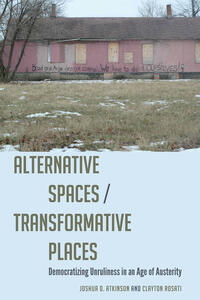
Alternative Spaces/Transformative Places addresses the rise of unruly spaces in society, as well as communicative strategies that citizens and activists may use to democratize them. With the widespread use of austerity measures by governments and cities, unruly spaces are an increasing fixture in our modern world. Cities such as Flint and Detroit in Michigan, Berlin in Germany, and even regions of rural America, have all been damaged by the neoliberal policies that have left cityscapes and physical environments altered and unrecognizable. We now understand that unruliness has become a constant in contemporary globalized society. As such austerity has degraded infrastructure, depleted local economies, and poisoned neighborhoods, we feel citizens must be empowered to reclaim such unruly spaces themselves. The book explores different strategies for the democratization of such spaces in urban environments, and the potential and problems of each. Such strategies can create alternative perceptions and alter pathways through those spaces—even connect communities hidden from one another. Students and scholars of urban communication and community activism, as well as human geography, will find the concepts and strategies explored in this book useful. The discussions related to austerity measures provide context for many contemporary neighborhoods and communities that have come to be neglected, while the chapters concerning unruly spaces provide explanations for the difficulty with such neglected or degraded environments. Finally, the illustration of different communicative strategies for the democratization of unruly spaces will demonstrate the possibilities for empowerment within communities that face such problems.